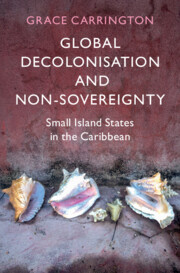
-
Select format
-
- Publisher:
- Cambridge University Press
- Publication date:
- 16 September 2025
- 31 July 2025
- ISBN:
- 9781009560450
- 9781009560443
- 9781009560412
- Dimensions:
- (229 x 152 mm)
- Weight & Pages:
- 0.633kg, 322 Pages
- Dimensions:
- (229 x 152 mm)
- Weight & Pages:
- 0.468kg, 322 Pages
Book description
Non-sovereign territories today account for more than half the states in the Caribbean but regional and global histories of the twentieth century tend to exclude them from narratives of protest and change. This book argues that our current understanding of global decolonisation is partial. We need a fuller picture which includes both independent and non-independent states, and moves beyond a focus on political independence, instead conceptualising decolonisation as a process of challenging and dismantling colonial structures and legacies. Decolonisation is neither an inevitable nor a linear process, but one which can ebb and flow as the colonial grip is weakened and sometimes restrengthened, often in new forms. Using the Cayman Islands, the British Virgin Islands, Martinique and Guadeloupe as case studies, Grace Carrington demonstrates that a focus on the processes of decolonisation in these non-sovereign states enriches our understanding of the global experience of twentieth century decolonisation.
Reviews
‘Countries that are decolonised and those that are not are often seen to have followed distinct historical paths. Grace Carrington challenges this view and argues non-sovereign territories are not anomalies but centrally embedded within decolonisation narratives. Using French and British Caribbean territories as her focus, she offers a nuanced and non-linear analysis of the still-to-be concluded decolonisation process.'
Peter Clegg - Professor in Politics and International Relations, and Head of the School of Social Sciences, University of the West of England
‘A terrific book that uses comparative historical investigation to highlight commonalities and differences in the post-1945 trajectories of four Caribbean territories, all of which have sustained their formal connections to an imperial power. Grace Carrington explores the changing economic, demographic and cultural complexions of her Caribbean Island case studies, the role of social movements, labour migration and 'big money' capital in particular. The result is a book that situates enduring imperial sovereignties within the wider global history of decolonisation.'
Martin Thomas - University of Exeter, and author of ‘The End of Empires and a World Remade'
Contents
Metrics
Altmetric attention score
Full text views
Full text views help Loading metrics...
Loading metrics...
* Views captured on Cambridge Core between #date#. This data will be updated every 24 hours.
Usage data cannot currently be displayed.
Accessibility standard: WCAG 2.0 A
Why this information is here
This section outlines the accessibility features of this content - including support for screen readers, full keyboard navigation and high-contrast display options. This may not be relevant for you.
Accessibility Information
The PDF of this book conforms to version 2.0 of the Web Content Accessibility Guidelines (WCAG), ensuring core accessibility principles are addressed and meets the basic (A) level of WCAG compliance, addressing essential accessibility barriers.
Content Navigation
Table of contents navigation
Allows you to navigate directly to chapters, sections, or non‐text items through a linked table of contents, reducing the need for extensive scrolling.
Index navigation
Provides an interactive index, letting you go straight to where a term or subject appears in the text without manual searching.
Reading Order and Textual Equivalents
Single logical reading order
You will encounter all content (including footnotes, captions, etc.) in a clear, sequential flow, making it easier to follow with assistive tools like screen readers.
Short alternative textual descriptions
You get concise descriptions (for images, charts, or media clips), ensuring you do not miss crucial information when visual or audio elements are not accessible.
Full alternative textual descriptions
You get more than just short alt text: you have comprehensive text equivalents, transcripts, captions, or audio descriptions for substantial non‐text content, which is especially helpful for complex visuals or multimedia.
Structural and Technical Features
ARIA roles provided
You gain clarity from ARIA (Accessible Rich Internet Applications) roles and attributes, as they help assistive technologies interpret how each part of the content functions.

